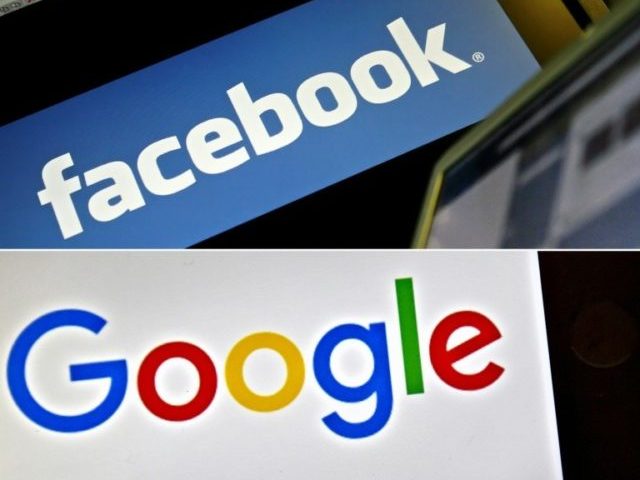The recent exposé published by Project Veritas included Twitter engineers allegedly detailing the ways they spy on their users, but these engineers claimed they still weren’t as “creepy as Facebook or Google,” — so exactly how creepy are these other Silicon Valley tech titans?
In the most recent Project Veritas video, the investigative journalism team headed by James O’Keefe went undercover to talk to current and former Twitter employees about their work at the company. What O’Keefe received from the employees was a number of detailed explanations, including that Twitter was purposefully shadow banning users, others claimed that conservative users were being targeted en masse using machine learning, and still others stated that Twitter had access to every user’s private messages and photos and would regularly read through them. Despite all this, Mihai Florea, a former employee, stated that although Twitter may collect a lot of information, they still aren’t as “creepy as Facebook or Google.”
To actually charge advertisers for money, we have to prove it was you, and that’s why using, like, the email address, or like, a cookie, something that can track you… That’s how we make most of our money… You’re basically paying for the right to use our website with your data basically, and it’s the same on every free website.
We know some stuff. We aren’t as creepy as Facebook or Google, but we know some stuff.
This begs the question, how creepy are the social media tech giants? Google has come under fire for prying too deeply into their user’s personal emails, this was done in order to target advertising towards users based on the emails they received. In June of 2017 Google agreed to stop scanning users emails for advertising purposes, the company said in a statement:
G Suite’s Gmail is already not used as input for ads personalization, and Google has decided to follow suit later this year in our free consumer Gmail service. Consumer Gmail content will not be used or scanned for any ads personalization after this change. This decision brings Gmail ads in line with how we personalize ads for other Google products. Ads shown are based on users’ settings. Users can change those settings at any time, including disabling ads personalization. G Suite will continue to be ad free.
However, consumer advocate news outlet the Consumerist noted that “just because Google won’t be scanning your emails to target ads, doesn’t mean it will stop scanning them altogether, as the company’s smart reply feature relies on such data.” This means that to some degree, whether it’s done by an automated service or not, Google still has access to and is scanning user emails.
It was also reported in November of 2017 that some Google users were being suddenly locked out of their Google Drive accounts in what they described as “creepy monitoring.” The sudden account locking came from an attempt by Google to search Google Drive documents for violations of their terms of service. The search tool was not performing properly and was flagging random files as violating Google’s terms of service. ZDNet reported that some users were not only being locked out of their files but having them deleted entirely. Google issued an update on the situation saying “This issue should now be resolved and you should be able to access your files. For more details, this morning, we made a code push that incorrectly flagged a small percentage of Google Docs as abusive, which caused those documents to be automatically blocked.”
Facebook also has a long history of quietly invading users privacy. One of the most blatant examples is a report from 2016 which states that Facebook had used users locations to determine which friends to suggest they add. Facebook later clarified that this was an experiment only performed on a small number of users, but the company seems to regularly perform tests on users without their knowledge or consent. In 2013, Facebook decided that users could no longer make their profiles private, forcing all Facebook profiles to show up in the platforms search feature regardless of which privacy features users had enabled.
Facebook also began demanding account holders use their real and full name as part of their Names on Facebook policy. If a user attempts to submit a blatantly fake name, Facebook now requests government issued ID be scanned into their system in order to verify the validity of the name. The company performed another of their other unannounced user experiments in 2014, when they removed the all of the positive or all of the negative posts from the timelines of approximately 689,003 users. This was done by Facebook’s data scientists to determine how positive and negative posts on the platform could affect the mood of users.
Adam Kramer, the lead research scientist on the project stated, “When positive expressions were reduced, people produced fewer positive posts and more negative posts; when negative expressions were reduced, the opposite pattern occurred. These results indicate that emotions expressed by others on Facebook influence our own emotions, constituting experimental evidence for massive-scale contagion via social networks.”
Due to these incidents, users may have chosen to opt out of Facebook, only the social media site has managed to even make that hard to do. In May of 2016, Facebook revealed that through the use of third-party cookies, like buttons and various other embedded Facebook elements in web pages, the company would even be tracking internet users that didn’t have Facebook accounts.
Lucas Nolan is a reporter for Breitbart News covering issues of free speech and online censorship. Follow him on Twitter @LucasNolan_ or email him at lnolan@breitbart.com.

COMMENTS
Please let us know if you're having issues with commenting.